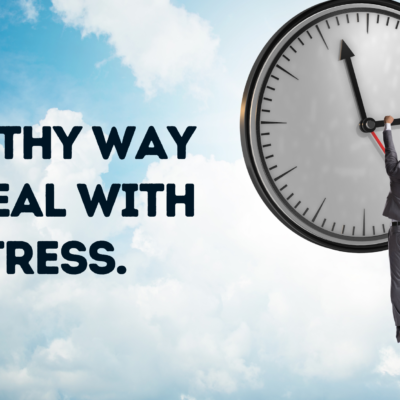Healthy Way to Deal with Stress: In the fast-changing world we are living in, stress has become an unavoidable part of our lives. Handling work, relationships, and personal well-being can create a lot of stress.
However, it is important to realize that not all stress is unhealthy; in fact, some level of stress is essential for growth and transformation. The main this is, how to manage stress in a healthy way that promotes your well-being.
Also Read:
- How to Deal with Emotional Stress?
- I Am Afraid To Be Alone- Causes and Prevention Tips.
- Simple And Effective Mood Booster To Uplift You.
- How to Develop Healing Mindset?
- How to Help with Anxious Thoughts?
What is stress and how it arises?
Before talking about effective stress management strategies, it is important to understand what stress is and how it arises. Stress is the body’s natural reaction to an upcoming challenge. It releases hormones like cortisol and adrenaline, preparing the body for a “fight or flight” response. While this response is important for survival, chronic stress, where the body stays in a high state for extended periods, can have harmful impacts on health.
The Impact of Chronic Stress on Us:
Mental Health: Constant stress is connected to mental health issues such as anxiety and depression. It can harm mental function, affecting memory, concentration, and decision-making.
Physical Health: Chronic stress contributes to different physical conditions, including cardiovascular issues, digestive problems, and weakened immune function. It can also worsen existing health conditions.
Behavioral Changes: Coping tools for stress can lead to unhealthy behaviors such as overeating, substance abuse, or social withdrawal, further affecting overall well-being.
Healthy Ways to Manage Stress:
Mindful Meditation
Adopting mindfulness and meditation practices is a powerful way to develop a sense of calm and self-awareness. Mindfulness includes being completely present in the moment and owning thoughts and feelings without judgment. Meditation, whether guided or silent, helps to quiet the mind, decrease stress hormones, and encourage a sense of inner peace.
Regular Exercise
Physical activity is a genuine stress reliever. Exercise releases endorphins, the body’s feel-good chemicals, which can help deal with stress and uplift mood. Whether it’s a brisk walk, yoga, or weight training, finding an activity that brings joy and fits into one’s routine is important.
Balanced Nutrition
A well-balanced diet plays an important role in stress management. Nutrient-rich foods nourish the body and support overall health. Avoid excessive caffeine, refined sugars, and processed foods, as they can contribute to increased stress levels. Include whole foods, fruits, vegetables, and lean proteins for sustained energy.
Adequate Sleep
Quality sleep is essential for stress management and overall well-being. Setting a constant sleep routine, creating a comfortable sleep environment, and practicing relaxation strategies before bedtime can contribute to better sleep quality.
Make Positive Social Connections
Building and maintaining positive social connections can provide a strong support system during stressful times. Sharing thoughts and feelings with trusted friends or family members promotes a sense of belonging and emotional support.
Time Management
Effective time management is an important part of stress reduction. Prioritizing tasks, setting realistic goals, and breaking them into manageable steps. Learning to delegate and saying no when necessary can stop feeling overwhelmed.
Breathing Exercises
Deep breathing exercises, such as diaphragmatic breathing or guided breathwork, trigger the body’s relaxation response. These techniques are easily available and can be practiced anywhere, delivering instant stress relief.
Hobbies and Creative Outlets
Engaging in hobbies and creative goals delivers an outlet for self-expression and stress release. Whether it’s painting, writing, gardening, or playing a musical instrument, devoting time to activities that bring joy is important for keeping a healthy work-life balance.
Therapeutic Techniques
Taking professional help through therapy or counseling can be instrumental in creating effective stress management strategies. Cognitive-behavioral therapy (CBT), mindfulness-based stress reduction (MBSR), and other therapeutic approaches can deliver valuable means for dealing with stress.
Setting Realistic Expectations
Usually, stress arises from unrealistic expectations, whether self-imposed or external. Setting realistic objectives and realizing that perfection is a myth, allows for a healthier mindset and eases unnecessary mental pressure.
Morning Rituals
Start the day with a few minutes of mindfulness or meditation. Set positive choices for the day, practice deep breathing, and avoid instantly checking emails or social media.
Midday Breaks
Take short breaks throughout the day to stretch, practice breathing exercises, or go for a brief walk. These moments of pause can help reset the mind and reduce stress.
Take Healthy Diet
Plan balanced meals and snacks, including whole foods, and stay hydrated. Avoid excessive caffeine intake, particularly in the afternoon, to support quality sleep.
Evening Wind-Down
Create a calming evening routine that includes activities such as reading, listening to soothing music, or practicing relaxation exercises. Avoid screen time during the day as much as possible and before bedtime to improve sleep quality.
Reflect and Adjust
Regularly reflect on stress levels and the significance of your stress-managing strategies. Be open to changing your strategy based on what works best for you.
At The End
In the search for a balanced and fulfilling life, effective stress management is important.
Remember, it is not about stopping stress completely but creating a healthy relationship with it, permitting for personal growth and improved overall well-being.








